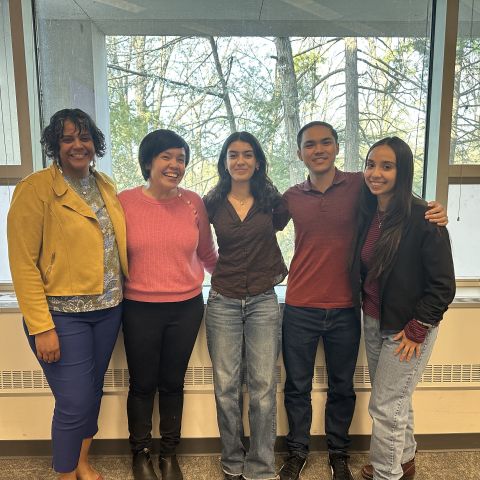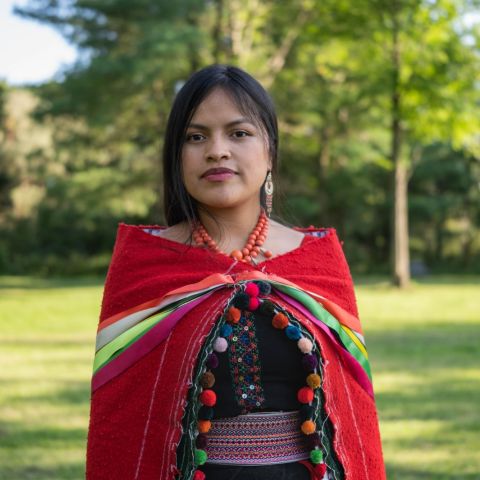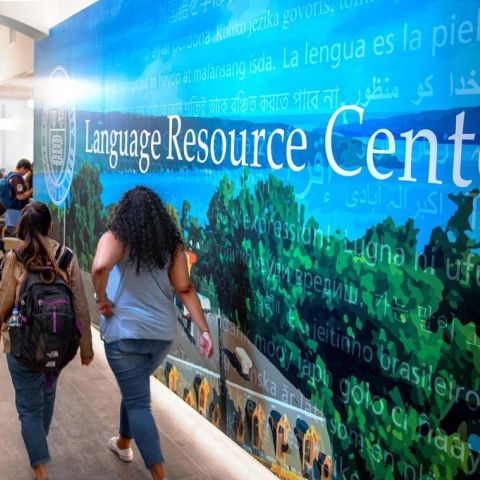Fellowship
Foreign Language and Area Studies Summer Fellowships
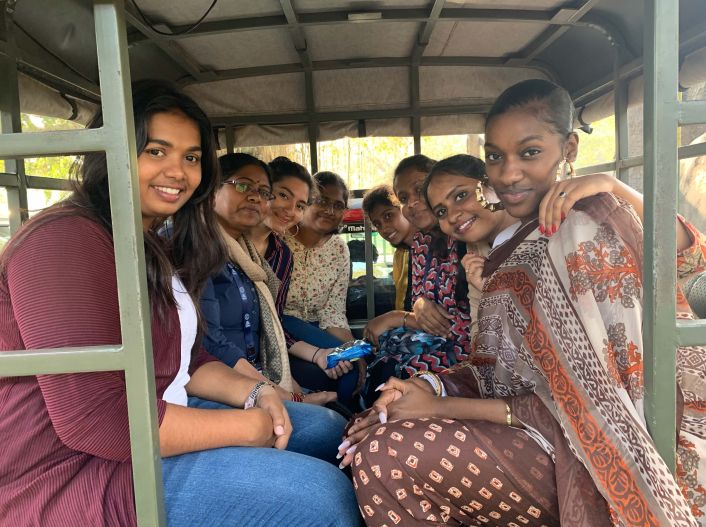
Details
Achieve fluency in a language of South Asia with the help of a Foreign Language and Area Studies (FLAS) summer fellowship. You’ll gain valuable knowledge about cultures and countries in which your language is commonly used, while developing skills in a language critical to the needs of the United States.
Awards must be used for summer 2026 intensive language study.
Deadline
- Apply by February 18, 2026 for summer 2026 language study.
Amount
- $3,500 stipend, plus fees and tuition allowance of up to $5,000, and possible travel support up to $1,000.
Eligibility
Graduate and undergraduate students are eligible. You must fulfill the following requirements:
- Be a citizen or permanent resident of the United States.
- Complete a FAFSA prior to the FLAS deadline.
- Agree to enroll in a summer 2026 intensive language program.
To be a successful applicant, you need to show potential for high academic achievement and demonstrate that you meet the necessary language training requirements. (Lowest priority will be given to a candidate who is a native speaker of the language for which an award is sought.)
How to Apply
In your application, you will be asked to provide information on your proposed study location. You must identify your preferred program(s).
We recommend the following summer intensive language programs, although we will consider any programs—domestic or overseas—that meet the minimum requirements.
- South Asia Summer Language Institute (SASLI), virtual through University of Wisconsin-Madison, offering Bangla, Dari, Gujarati, Hindi, Marathi, Nepali, Pashto, Punjabi, Sinhala, Tamil, Tibetan, and Urdu
- Middle Eastern and Mediterranean Language Institute (MEDLI), virtual through University of Wisconsin-Madison, offering Persian
- American Institute for Indian Studies (AIIS), in-person at various locations in India, offering Bengali, Gujarati, Hindi, Kannada, Malayalam, Marathi, Persian, Punjabi, Oriya, Tamil, Telugu, Tibetan, and Urdu
- South Asia Institute (SAI), virtual through University of Texas at Austin, offering Kannada, Malayalam, and Telugu
Your program must be at least six weeks in duration and offer at least 120 student contact hours. Please indicate the language level you intend to study during the summer 2026 award period.
Requirements
Additional Information
Undergraduate Migrations Scholars

Details
Join our team of undergraduate Migrations scholars to think in new ways about global migration challenges and understand our world on the move. As an undergraduate Migrations scholar, you'll play an active role in migration-related scholarship and programming on campus.
With the support of Migrations Program director Katie Fiorella and our cohort of graduate fellows, you will explore key issues in migration studies and build leadership skills alongside a cohort of your peers. In the spring semester, scholars will have a chance to plan an event on a migration theme of their choice.
Last spring, our cohort of Migrations scholars hosted two events featuring panels of migrations faculty and human rights organizers:
- Margins and Mobilization: Migrant Worker Precarity and Power in the Trump-era Economy
- From Colony to Diaspora: Enduring Legacies of U.S. Territorial Rule in Puerto Rico and the Philippines
Eligibility
All undergraduate students who are interested in migration studies are encouraged to apply. Previous Migrations scholars are welcome to apply again.
You should be in good standing academically and have no unresolved disciplinary charges or sanctions, be enrolled in an undergraduate degree program at the time of the fellowship (e.g., not on leave of absence), and be on campus in Ithaca for in-person meetings and mentoring.
Deadline
September 30, 2025
Amount
Students can elect to enroll in a one-credit course or receive $250 upon successful completion of the fellowship in spring.
How to Apply
Fill out the online application. The application requires you to submit a short paragraph (250 words) about why you want to be a Migrations scholar and your resume or CV.
If you have any questions, contact migrations@einaudi.cornell.edu.
Additional Information
IES Graduate Fellows

Details
The IES Fellows will advance their research and contribute to the European Studies community by attending and engaging in IES-hosted talks, and by organizing and taking part in collective activities such as a graduate research workshop or discussion group. The Institute supports these activities with a small research stipend to each Fellow. IES Fellows also receive priority for IES research and travel fellowships. Fellows are typically appointed for one year and may be renewed for subsequent years.
Eligibility
The IES fellows program is intended primarily for full-time doctoral students in the social sciences and the humanities, whose research focuses on some aspect of European societies or cultures, and who plan to be in residence at Cornell for the entire academic year. Semester-length participation in the program, and applications by Master’s students, will be considered on a case-by-case basis.
Amount
$500 research stipend.
Additional Information
Southeast Asian Qualitative Social Sciences Postdoctoral Associate

Details
We are seeking an independent and highly motivated social scientist with fieldwork and area expertise on one or more Southeast Asian countries. Scholars from a range of fields including geography, anthropology, sociology, data/information science, public and ecosystem health, planning, political science, and environmental social science are encouraged to apply. We especially welcome someone able to work across disciplinary boundaries and is interested in the intersections between research, public engagement, and policy making in the Southeast Asian context.
Additional Information
Southeast Asian Environmental Humanities Postdoctoral Associate

Details
Potential topics may include and are not limited to humanistic or qualitative research approaches to climate breakdown, biodiversity, human-animal relations, plantations, environmental justice, commodity chains, extraction, and the cultural politics of food as they relate to Southeast Asia and/or Southeast Asian diasporas. We especially welcome applicants with PhDs in the humanities, interpretive social sciences such as anthropology, or interdisciplinary degrees such as religious studies, Southeast Asian studies, ethnic studies, feminist studies, or science and technology studies.
Additional Information
Global Impact Graduate Fellowships

Details
We're looking for graduate students to join the Einaudi Center's inequalities, identities, and justice team as they map out a new global studies curriculum. Apply now to be a fellow in the spring 2024 semester!
Graduate fellows receive a stipend of $1,000 for the semester.
New in 2024: Global Impact Fellows
Launching in spring 2024, this opportunity is open to grad students from all research disciplines with a demonstrated interest in interdisciplinary and/or international work. Selected fellows will form a focus group to develop a global studies curriculum for a future Einaudi Center graduate certificate.
Global Impact Fellows will meet regularly through the spring 2024 semester with faculty fellows Edward E. Baptist and Jennifer Newsom. You'll play a crucial role in designing syllabi and presenting a showcase of graduate research with global impact.
Inequalities, Identities, and Justice
The Einaudi Center supports public scholarship and thought leadership to address inequalities experienced across the globe, including cleavages in society like race, religion, gender and sexuality, class, caste, language, and ethnicity. We seek to identify opportunities for transformative change and increased justice in migration and citizenship regimes, climate and land policy, economic opportunities, food systems, health, politics, and policing.
Deadline
January 24, 2024
Amount
Stipend of $1,000 for the spring semester.
How to Apply
Email a letter of interest to Sarah Pattison, associate director of academic programs. Selected students will be notified by February 2, 2024. Your letter should outline the following:
- Your background in interdisciplinary and/or international work (through research projects, coursework, or other experiences);
- How the fellowship will advance your research, graduate studies, or career goals;
- What interests you about global studies and Einaudi's planned curriculum development (see blue box above).
Questions?
If you have questions about the fellowship or your application, email Einaudi Center academic programs.
Additional Information
Undergraduate Global Scholars
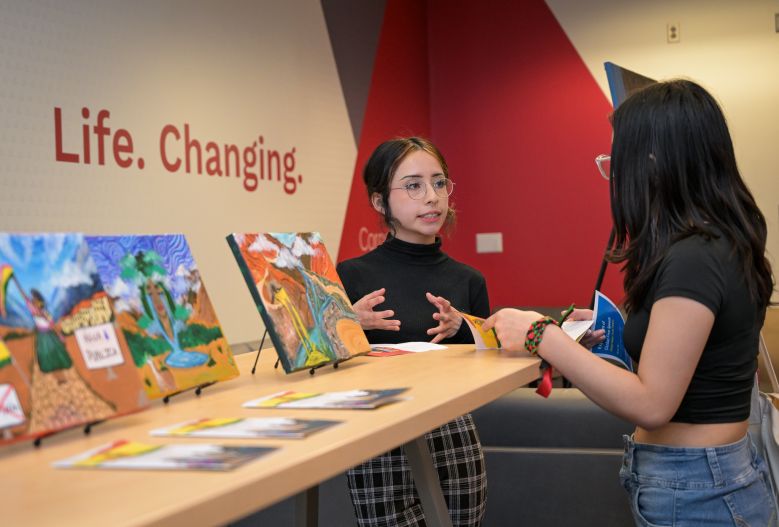
Details
Undergraduate Global Scholars are student leaders in the campus community. Join our next cohort of students to contribute to the campus conversation on the future of international aid.
This competitive fellowship program is open to students from all colleges and majors with a passion for big global questions and speaking across differences. We will provide a toolkit of resources for weighing challenging questions as you build your practical skills in global public discourse.
Your unique skills—whether you are a writer, scholar, activist, artist, poet, or hands-on practitioner—play an important role in imagining the future. By the end of the program, you'll be an active global citizen and champion for social impact.
Is (Cutting) International Aid Good?
The work of this year's Global Scholars contributes to the Einaudi Center's 2025–26 theme: Is (Cutting) International Aid Good?
Large cuts to U.S. foreign aid threaten global health, education, people who are migrating, peace and stability, the environment, democratic governance, food security, and more. As the landscape of international aid evolves, the world faces new questions about the impact of aid on communities, what makes international aid effective, and how to move forward.
Our Global Scholars will grapple with these questions in their capstone projects, considering the multiple perspectives that shape the global landscape of international aid and the communities impacted.
What You'll Learn
The Einaudi Center creates a space for studying and practicing how individuals and communities can engage about, with, and across difference and disagreement to work toward collective understanding and action on challenging global issues. Our focus will be on skills of discourse, empowering you to thoughtfully address big questions on campus and beyond. You will learn how to:
- Analyze complex global issues.
- Understand issues from multiple perspectives.
- Test your ideas through research.
- Respectfully interact with communities impacted by an issue.
- Responsibly engage in advocacy.
- Craft and share a capstone project with the campus community.
Mentors and Networking
As a Global Scholar, you'll meet and engage with prominent experts and leaders visiting the Einaudi Center, including this year's speakers at the Bartels World Affairs Lecture and Lund Critical Debate.
You'll attend participatory workshops led by our Einaudi Center practitioner in residence Paul Kaiser and faculty mentor Ed Mabaya—who are expert researchers and practitioners on international development. You'll also help plan and contribute to a campus showcase about the future of international aid.
Deadline
Applications for 2025-26 are due September 14, 2025.
Amount
$500 stipend
How to Apply
Fill out the online application. Selected students will be notified by early October and the program will begin mid-October.
Questions?
Visit us at the International Fair on August 27 or join us for an information session on September 4.
If you have questions about the Global Scholars program or your application, email Einaudi Center academic programs.
Additional Information
Funding Type
- Fellowship
Role
- Student
Program
Rare and Distinctive Language Fellowships

Details
If you love languages, our newest summer funding opportunity is for you!
Rare and distinctive (RAD) languages set Cornell apart. Cornell offers over 50 languages, including some of the world's least frequently taught—from Ukrainian to Quechua, Urdu to Burmese.
With the help of a RAD Language Fellowship, you can achieve fluency in your choice of these languages. Learning RAD languages offers insight into vibrant cultural identities and traditions and gives you the ability to work effectively in places around the globe.
Cornell Chronicle: Einaudi Fellowships Support Students Learning Uncommon Languages
Amount
For summer study at any level (graduate or undergraduate): $3,500 stipend, plus a fees and tuition allowance of up to $5,000.
Eligibility
All currently enrolled Cornell graduate and undergraduate students are eligible for RAD fellowships. You do not need to be a citizen or permanent resident of the United States or complete a FAFSA, which FLAS requires.
You must be planning to study a modern language among the least commonly taught languages offered at Cornell (see sidebar).
To be a successful applicant, you need to show potential for high academic achievement and agree to pursue full-time study of a language in accordance with the university’s requirements. You do not need to have previous experience or coursework in the language you plan to study. Lowest priority will be given a candidate who is a native speaker of the language.
How to Apply
In your application, you will be asked to provide information on your proposed study location. You must identify your own preferred program.
We recommend the following U.S. summer intensive language programs, although we will consider any programs—domestic or overseas—that meet the minimum requirements.
- African Summer Language Institute (ASLI)
- Indiana University Summer Language Workshop
- South Asia Summer Language Institute (SASLI)
- Southeast Asian Studies Summer Institute (SEASSI)
- YIVO-Bard Summer Program
Your program must be at least six weeks in duration and offer at least 120 student contact hours. Please indicate the language level you intend to study during the award period.
Requirements
- Be a currently enrolled Cornell student.
- Plan to attend an approved summer intensive language acquisition program.
- Use the online application to submit your materials, including:
- Two letters of recommendation from faculty members.
- An official transcript of one full academic year of coursework.
- An optional third letter of recommendation from a language instructor.
Foreign Language and Area Studies Fellowships
RAD fellowships expand the scope of language study supported by Einaudi's Foreign Language and Area Studies Fellowships. If you are a U.S. citizen or permanent resident studying a language of South or Southeast Asia, please apply for a FLAS fellowship for a summer or full year of study. Apply for the RAD Language Fellowship if you are:
- studying a language from outside of South or Southeast Asia, or
- studying a language of South or Southeast Asia, but you are not a U.S. citizen or permanent resident.
Both opportunities have the same deadline.
RAD Language News and Opportunities
Additional Information
IES Graduate Research Grant
Details
The IES Graduate Research Grant is available to graduate students in any field of study whose research is focused on the study of Europe.
Criteria
- Quality of the research proposal within the field
- Validity and feasibility of the project
- Research and professional qualifications
- Strength of academic performance and letter of recommendation
Requirements
- 4-5 page research proposal (double-spaced) with bibliography
- Project budget
- 1 letter of recommendation*
Winners receive up to $4,000 in funding, distributed through their bursar account. The IES Graduate Research Grant application is conducted together with the Manon Michels and Michele Sicca Grant competitions. Candidates submit a single application and are automatically considered for each of the awards.
Contact IES with questions about this award.
Additional Information
Luigi Einaudi Graduate Dissertation Fellowship

Details
The Luigi Einaudi Graduate Dissertation Fellowship is a semester-long or year-long fellowship available to graduate students in modern European government, history, economics, and related social science fields. The award consists of a graduate student stipend for one or two semesters, in-absentia fees, and enrollment in Cornell's student health insurance plan.
Criteria
This fellowship is designed to enable graduate students to conduct field and archival research focused on Europe for an extended period (4-8 months). To be eligible, applicants must have completed the "A" exam in their department or have an exam date scheduled prior to submitting their application and have a dissertation project approved by their dissertation committee.
- Quality of the research proposal in a social science field
- Validity and feasibility of the applicant’s research project
- Research and professional qualifications
- Strength of the student’s academic performance and letters of recommendation
Requirements
- 8-10 page project proposal (double-spaced) with bibliography
- 2 letters of recommendation
Contact IES with questions about this award.

